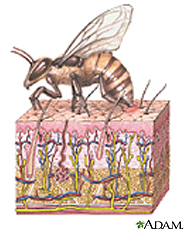 |
 |
 |
Other Health Topics:

-
Related Topics
-
Go Local
- Services and providers for Insect Bites and Stings in the U.S.
-
National Institutes of Health
- The primary NIH organization for research on Insect Bites and Stings is the National Institute of Allergy and Infectious Diseases
Insect Bites and Stings
Also called: Bug bites
Most insect and spider bites are harmless, though they feel unpleasant. Bee, wasp, and hornet stings and fire ant bites usually hurt. Mosquito, flea and mite bites usually itch. Insects can also transmit diseases, such as yellow fever and malaria. These diseases mainly are a risk for travelers outside the United States.
To prevent insect bites and their complications
- Don't bother insects
- Use insect repellant
- Wear protective clothing
- Be careful when you eat outside because food attracts insects
- If you know you have severe allergic reactions to insect bites, carry an emergency epinephrine kit
Start Here
- Beware of Bug Bites and Stings(Food and Drug Administration)
-
Bug Bites and Stings(Nemours Foundation)
Also available in Spanish
- Insect Bites and Stings: First Aid(Mayo Foundation for Medical Education and Research)
| Basics | Learn More | Multimedia & Cool Tools |
|---|---|---|
| Research | Reference Shelf | For You |
-
Overviews
- Venomous Creatures(Arizona Poison & Drug Information Center)
-
Latest News
- DEET Works Because Mosquitoes Hate The Smell(08/22/2008, HealthDay)
- Protect Your Skin during the Summer Months(07/28/2008, Centers for Disease Control and Prevention)
-
Prevention/Screening
- How to Use Insect Repellents Safely(Environmental Protection Agency, Office of Pesticide Programs)
- Insect Repellent DEET(Environmental Protection Agency)
- Mosquito Bites(Mayo Foundation for Medical Education and Research)
-
Stinging Insect Allergy: How to Avoid the Ouch(American Academy of Allergy, Asthma, and Immunology)
Also available in Spanish
- Updated Information Regarding Insect Repellents(Centers for Disease Control and Prevention)
-
Specific Conditions
- Anaphylaxis(Mayo Foundation for Medical Education and Research)
- Bedbugs(Mayo Foundation for Medical Education and Research)
- Health Hazards of Imported Fire Ant Stings(American Academy of Allergy, Asthma, and Immunology)
- Spider Bites: First Aid(Mayo Foundation for Medical Education and Research)
-
Stinging Insect Allergy(American Academy of Allergy, Asthma, and Immunology)
Also available in Spanish
-
Related Issues
-
Can I Get HIV from Mosquitoes?(Centers for Disease Control and Prevention)
Also available in Spanish
-
Can I Get HIV from Mosquitoes?(Centers for Disease Control and Prevention)
-
Pictures & Photographs
- Arthropod (Insect) Bite or Sting(Logical Images)
-
 Bedbug Bite(Logical Images)
Bedbug Bite(Logical Images)
- Fire Ants Photos(American Academy of Allergy, Asthma, and Immunology)
- Life Cycles: Fleas and Ticks(Food and Drug Administration) - Links to PDF
- Stinging Insect Matching Game(American Academy of Allergy, Asthma, and Immunology)
-
Clinical Trials
-
ClinicalTrials.gov: Bees
 (National Institutes of Health)
(National Institutes of Health)
-
ClinicalTrials.gov: Culicidae
 (National Institutes of Health)
(National Institutes of Health)
-
ClinicalTrials.gov: Insect Bites and Stings
 (National Institutes of Health)
(National Institutes of Health)
-
ClinicalTrials.gov: Bees
-
Journal Articles
References and abstracts from MEDLINE/PubMed (National Library of Medicine)
- Article: The potential direct impacts on human health resulting from the...
- Article: Caterpillar-induced bleeding syndrome in a returning traveller.
- Article: Spatial targeted vector control is able to reduce malaria prevalence...
- Insect Bites and Stings -- see more articles
- Medical Encyclopedia Return to top
-
Organizations
-
Centers for Disease Control and Prevention
Also available in Spanish
-
National Institute of Allergy and Infectious Diseases

-
Centers for Disease Control and Prevention
-
Children
- Arthropod (Insect) Bite or Sting(Logical Images)
-
Hey! A Bedbug Bit Me!(Nemours Foundation)
Also available in Spanish
-
Hey! A Bee Stung Me!(Nemours Foundation)
Also available in Spanish
-
Hey! A Black Widow Spider Bit Me!(Nemours Foundation)
Also available in Spanish
-
Hey! A Brown Recluse Spider Bit Me!(Nemours Foundation)
Also available in Spanish
-
Hey! A Chigger Bit Me!(Nemours Foundation)
Also available in Spanish
-
Hey! A Fire Ant Stung Me!(Nemours Foundation)
Also available in Spanish
-
Hey! A Flea Bit Me!(Nemours Foundation)
Also available in Spanish
-
Hey! A Gnat Bit Me!(Nemours Foundation)
Also available in Spanish
-
Hey! A Louse Bit Me!(Nemours Foundation)
Also available in Spanish
-
Hey! A Mosquito Bit Me!(Nemours Foundation)
Also available in Spanish
- Hey! A Scorpion Stung Me!(Nemours Foundation)
-
Hey! A Tarantula Bit Me!(Nemours Foundation)
Also available in Spanish
- What to Do When You're Bugged by Bugs(Nemours Foundation)
-
Teenagers
- Bug Bites and Stings(Nemours Foundation)
| Home | Health Topics | Drugs & Supplements | Encyclopedia | Dictionary | News | Directories | Other Resources | |
| Disclaimers | Copyright | Privacy | Accessibility | Quality Guidelines U.S. National Library of Medicine, 8600 Rockville Pike, Bethesda, MD 20894 National Institutes of Health | Department of Health & Human Services |
Date last updated: 10 September 2008 Topic last reviewed: 22 June 2008 |






